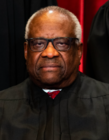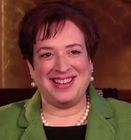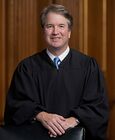Ketanji Brown Jackson
“Doctor, my eyes!”
Ketanji Brown Jackson (or KBJ, born September 14, 1970) is the black woman whom President Joe Biden appointed to the U.S. Supreme Court in 2022 to replace retiring Justice Stephen Breyer in order to fulfill a campaign promise that his first nominee would be the best person he could find, provided she was a black woman.
Early life[edit]
Ketanji was born in Washington, D.C. to Johnny and Ellery Brown, both of them black as the ace of spades. The family moved to Miami so Johnny could attend law school. Ketanji studied law at Harvard University, part of the Ivy League, an attribute where advocates of diversity on the court tend to seek unanimity. She graduated in 1992 after writing a senior thesis entitled "Plea Bargaining as Evidence of America's Inherent Racism".
Career[edit]
After law school, Ketanji clerked for several judges, among them Justice Stephen Breyer, whom she would eventually be nominated to replace. This is regarded as irony by everyone who does not know what the word means.
She also served as a public defender in Washington, winning "uncommon victories" allowing uncommonly bad suspects to avoid the uncommonly long arm of the law.
U.S. Sentencing Commission[edit]
In 2009, President Barack Obama plucked Ketanji from obscurity and put her on the U.S. Sentencing Commission, tasked with telling judges how many months or years to sentence criminals to prison, so they would not pull sentences out of a bodily orifice, as Ketanji would go on to do. In 2012 Obama moved her up to U.S. District Court. During the confirmation hearings, Rep. Paul Ryan, who turned out to be an in-law, spoke of her "character [and] her integrity", and that should have been a tell right there. As a District Judge, Ketanji proved herself to be in the mainstream of the U.S. judiciary, ruling that President Donald Trump should be stopped at every turn.
The New York Times would write that Ketanji did "not yet have opinions expressing a legal philosophy" and thus that there was no way to tar her as a member of the left-wing, certainly not compared to the Times. Politico would not call her liberal, though it did say she was ideal for combat with the court's conservatives.
Ketanji married surgeon Patrick Jackson, a Boston Brahmin related to Ryan and surely partly responsible for America's regrettable heritage that KBJ has spent a career fighting against. She adopted her compromise surname but magnanimously declined the hyphen. The couple has two daughters, who are probably milk-chocolate-colored. But centuries of mistreatment of African-Americans does not keep the even-handed KBJ from allowing the children a few scraps of food from the dinner table.
Supreme Court nomination[edit]
Context[edit]
In the 2020 Presidential campaign, Biden had bombed in Iowa, courtesy of an adversarial man who "needed to work on his pecs", and in New Hampshire thanks to a "lying, dog-faced pony soldier". Biden was on the ropes and needed to pull a proverbial rabbit out of a hat. Then, rapid-fire: Biden vowed that his first pick for the Supreme Court would be a black woman; verifiably black (though probably male) Rep. Jim Clyburn of South Carolina embraced Biden's candidacy; every other credible candidate abruptly dropped out of the race, and Biden aced the South Carolina primary and was on his way to the nomination, ultimately defeating even Bernie Sanders, who alone failed to realize that the fix was in. Satan took one look at Hunter Biden and did not insist on a first-born.
In 2022, Justice Stephen Breyer called it quits, mindful of the way Ruth Bader Ginsburg had held on for so long that her opponents got to pick her successor. The tea leaves were signaling a Republican victory in November, which would lead to outrageous new reasons why the Senate need not take up replacing him at all. Now black Democrats called in their chits and their chitlins, reminding the Great Uniter of his promise to engage in a little overt racism among friends. Americans were used to seeing a black man on the Court, also three women, but it was now time for them to prove they didn't hate black women. A moderate black woman from Clyburn's own South Carolina, Michelle Childs, was put forward and slapped down, wiser Democratic minds [sic] concluding that the party of Mitch McConnell would never go to the mat over the replacement of one extreme Justice with another. KBJ stepped forward to fill the void.
The hearings[edit]
KBJ's confirmation hearings went smoothly, the Democrats understanding that no one would ask for a transcript, and the Republicans wanting to make their adversaries look stupid but without attracting any headlines.
KBJ was asked about her service on the Federal Sentencing Commission (which could not find any record of it), devising guidelines for number of years in prison that KBJ would go on to flout if the case were about drugs or pornography; was given a chance to deny her knowledge of Critical Race Theory, until Republicans put into the record her speeches touting it, as did the syllabus of a school for which she was a director. The hearings served their vital function to the American people: Establishing that she was on the left-wing and that no one was going to do a damned thing about it.
The colloquy turned to cross-dressing and Marsha Blackburn of Tennessee finally asked KBJ to define the word woman. Even Uncyclopedia can do that, but KBJ could not, "not in this context", that is, a context in which the sex change community was tuned in and hanging on her every word. Further questioning revealed that KBJ could not define the words due process or recess for lunch either. That bought Blackburn a new tour of talk radio programs, while KBJ continued skating toward Senate confirmation. Her sudden inability to define a woman makes it questionable how Biden could know he had nominated one.
KBJ was confirmed by a Senate vote of 53-47. Justice Breyer bided his time and "played out the string" in the 2022 Supreme Court session as the senior member of the dissent in dozens of 6-3 decisions before his resignation took effect. On June 30, KBJ became a Supreme Court Justice, in a swearing-in ceremonly that Biden attended and even got her name right.
Supreme Court Justice[edit]
KBJ's first term began that October, and she distinguished herself as a Justice (1) with little of substance to say and (2) unable ever to stop saying it — in stark contrast to fellow African American Justice Clarence Thomas, who is always silent but has a lot to say, not just about the case at hand but all the shoddy precedents that came before it (and him). Happily, the two are seated so far apart, like matching lawnboy bookends bracketing a small collection of smut, that they cannot fight, nor probably notice one another.
Cases[edit]
- In 303 Creative LLC (2023), a gay couple asked the only Christian business in town to make a website on their imminent marriage and, when the owner predictably declined, predictably tied her up in lawsuits for years. The Court was choking for a decision firmer than its Masterpiece Cakeshop — where it had ruled that Colorado might be right to compel the owner to do business but can't be such a dick about it. KBJ tried to compare it to a business that refuses to serve blacks. Sadly, Brown-Jackson was "Running on Empty" and Gorsuch stole the show, tying the U.S. Solicitor up in rhetorical knots.
- In Garland v. Cargill (2024), KBJ got a chance to excel — and even to uphold Trump, who had reacted to a 2017 Las Vegas gun massacre using a bump stock by administratively banning them all. A bump stock is a favorite attachment of marksmen who wish to fire bullets faster at the expense of ever hitting anything. KBJ, like Justice Annie Oakley Barrett, is an accomplished bump-stock shooter and told the Court the device let a person shoot "800 rounds a second." Court reporters were in awe, as this feat would require changing the 50-bullet magazine fifteen times. This is how KBJ acquired the nickname "Quick-Draw Ketanji".
| ||||||||||||||||||||||||||











